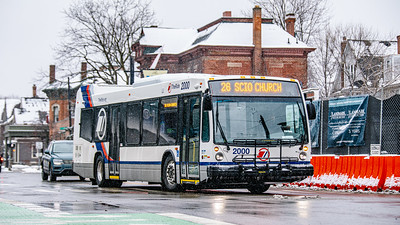In August, the communities of Ann Arbor, Ypsilanti and Ypsilanti Township voted to renew and extend a public transportation millage. In Ann Arbor, the City of Ypsilanti and Ypsilanti Township, the assessment will rise to 2.38 mills from 1.95 mills, .91 mills and .7 mills, respectively.
The millage was not without controversy. The Ypsilanti Township Board of Trustees objected to the millage, based on the amount of increase. Despite their objections and multiple mailings to households, residents there passed the millage request by 118 votes. The proposal enjoyed greater support in the City of Ypsilanti and the City of Ann Arbor. Overall, the millage request passed 60%-40% and takes effect in 2024.
The millage request promises increased access to mass transit, which creates benefits for other Washtenaw County services providers, like Washtenaw Community College. Although WCC currently has AAATA service on campus, the AATA serves only these three communities. (It provides minimal service through certain corridors in Pittsfield Township that connect Ann Arbor and the Ypsilanti area.)
Improving mass transit in unserved areas of the county could increase enrollment at WCC. The Seldin Haring-Smith Foundation underwrote a 2021 analysis of public transportation and its effects on higher education. By making minor improvements in transportation infrastructure, communities could make 25% more community colleges accessible through public transportation.
The study considers Washtenaw Community College “accessible by public transportation.” Realistically, it is only accessible if you can get to Ann Arbor, Ypsilanti, or Ypsilanti Township. Taxpayers elsewhere have not authorized investments that would enable their residents to access Washtenaw County’s’ public transportation infrastructure.
What would regional public transportation mean for WCC
It opens the question of how many residents of Washtenaw County cannot attend Washtenaw Community College because they lack the means to get to campus. While I know that WCC provides a wide range of online classes, not all classes are available online. And not all residents have the high speed Internet and computer equipment needed to participate in online instruction. (If they cannot afford transportation, there is a good possibility they cannot afford high speed Internet service, computer equipment and software they will need to participate in classes.)
The Seldin Haring-Smith Foundation study shows that widely available public transit has a significant, positive impact on community college attendance and enrollment. My hope is that the residents of non-participating communities in Washtenaw County will rethink the potential benefits of regional public transit for their most economically challenged residents. The WCC Administration and its Board of Trustees would also do well to support the extension of mass transit to other areas of Washtenaw County.
Photo Credit: Wu Haoxiang , via Flickr



























